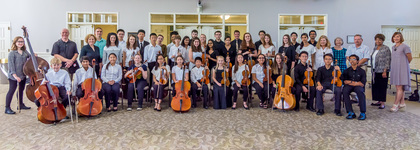The 700-seat Scott Concert Hall in Brevard College’s Porter Center was well attended for the final concert of this year’s Brevard Philharmonic Orchestra season. The program was a balanced one of classical, romantic and 20th century music well chosen for this particular orchestra in its current stage of development.
Leading off the program was Weber’s familiar Overture to Der Freischutz. The initial French horn solo by Hobart Whitman and the cello section entry were right on target, as befits a work whose title translates loosely as The Marksman. But when the full resources of the orchestra were brought to bear in the lively center section, there was a general lack of precision. One of the low French horns lacked proper intonation. The oboes sounded thin. The upper string players did not all have a sense of the larger structure; some were simply playing notes. This was the weakest performance of the afternoon.
Principal trumpet Larry Black came on stage for the Joseph Haydn Trumpet Concerto in E-Flat Major. Having heard Black in an outstanding performance of Alexander Arutiunian’s Trumpet Concerto with the Hendersonville Symphony Orchestra in 2007, my expectations were high. While Black’s solo performance had no major defects, there were a few rapid passages during which the violins produced some confused sounds, muddying the waters in which Black was providing precision.
My disappointment with the violins continued after intermission during selections from Grieg’s Peer Gynt Suite #1. In “Aase’s Death,” some second violins were not moving at the correct moment. In “Anitra’s Dance,” violin intonation disputes occurred. Some back desk violinists used different strings and positions than the front desk professionals. To be commended was the marvelous pianissimo that the orchestra achieved in “Aase’s Death.” Seldom have I seen a regional orchestra achieve this degree of clarity in a sustained quiet passage.
Khachaturian’s suite from Masquerade completed the program. This suite was composed as incidental music for a play, and contains a combination of Russian and Armenian influences. The orchestra seemed to really enjoy playing this piece. The ritardandos in “Waltz” were well observed. Ralph Congdon provided a fine solo violin in “Nocturne” while the horns and clarinets were equally good. The tuba was appropriately irreverent in the show-tune-like “Mazurka.” The cello section, which had been good all day, was particularly solid in “Romance.” In the final “Galop,” the orchestra may not have been quite precise but they threw themselves into the music and conveyed a good sense of the burlesque.
Donald Portnoy has been the Artistic Director of the Brevard Philharmonic Orchestra for two seasons now. The sponsoring Brevard Orchestra Association was inspired in this choice of a conductor. Portnoy’s conducting style is concise and purposeful. He provides liberal cues to assist those amateur musicians who fill out the back desks of the Brevard orchestra, cues that the professional members of the BPO would not always need. In short, Portnoy is a “teaching” conductor, just what the BPO needs.
One of the great pleasures of a teacher is to see his or her students succeed, and the BPO has made strides since I heard them at their first appearance under Dr. Portnoy’s baton in September 2007. I anticipate even more improvement as his influence permeates all aspects of the orchestra including the gradual addition of some needed higher quality players to fill out the upper string sections.











